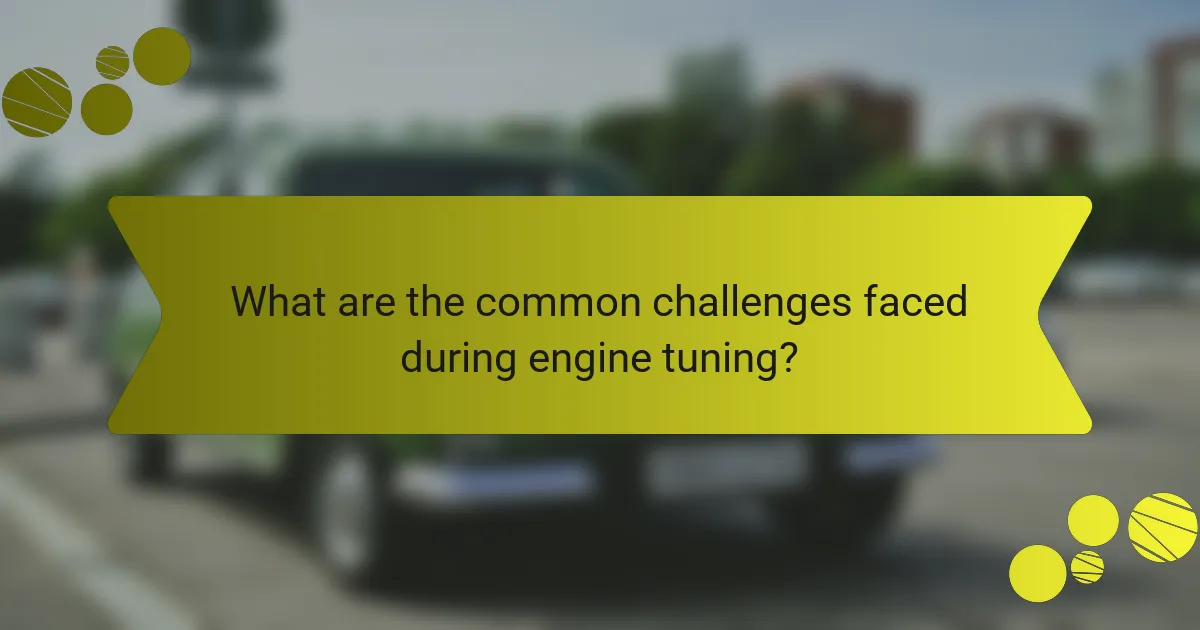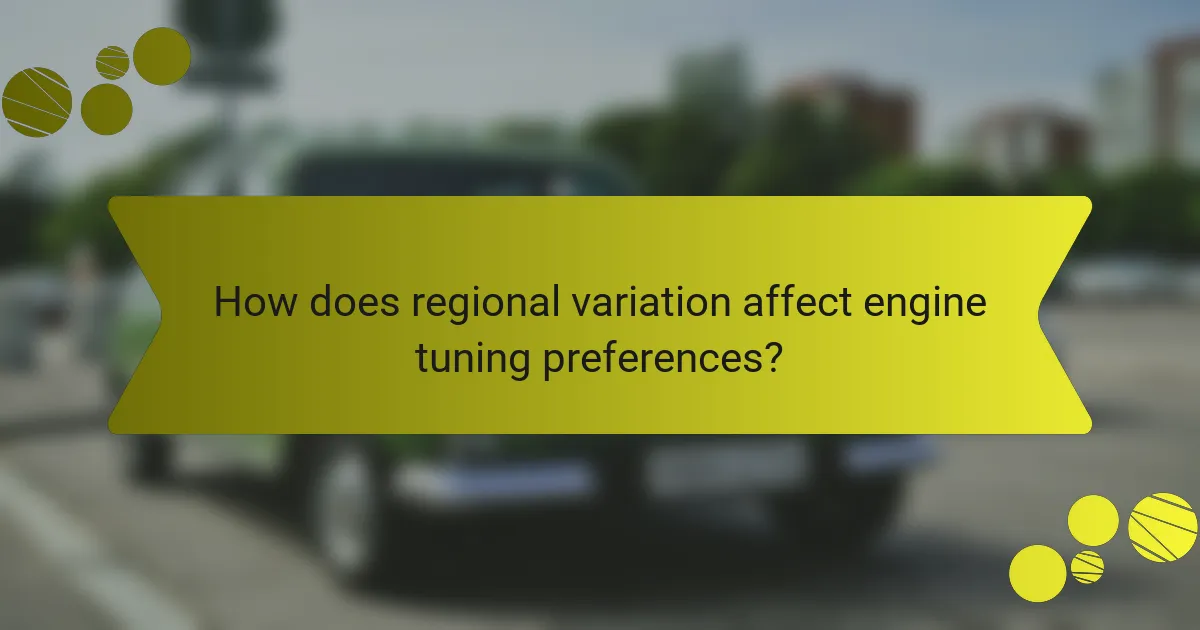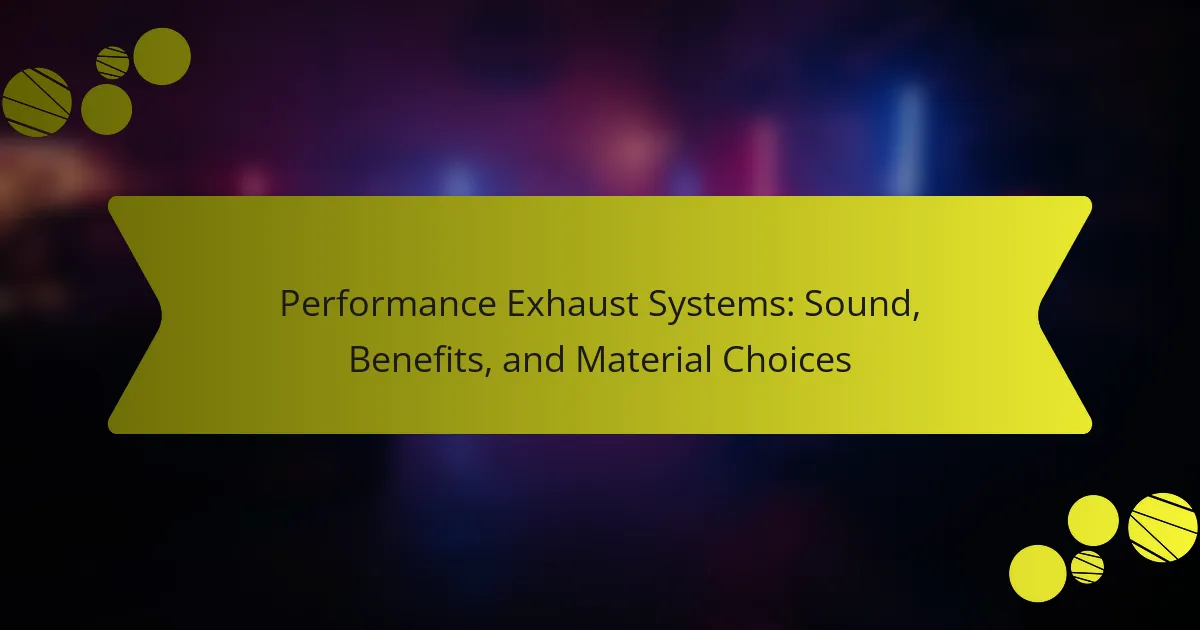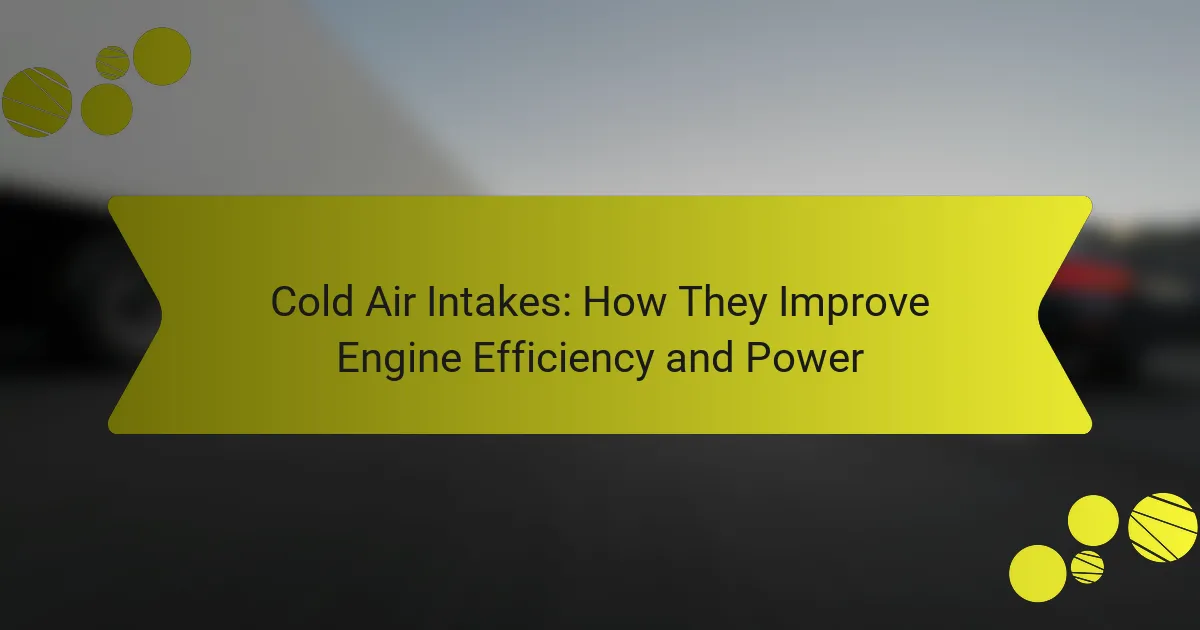Engine tuning enhances vehicle performance, efficiency, and responsiveness. Key techniques include ECU remapping, intake and exhaust modifications, and dyno tuning. Essential tools like engine management systems and diagnostic scanners facilitate precise adjustments. Expected outcomes feature increased horsepower, improved fuel efficiency, and optimized throttle response, addressing common challenges in achieving optimal performance.

What are the key techniques used in engine tuning?
Engine tuning techniques focus on enhancing performance and efficiency. Key techniques include ECU remapping, which adjusts the engine’s computer settings for optimal performance; intake and exhaust modifications that improve airflow; and dyno tuning, which uses a dynamometer to measure power output and fine-tune settings. Each method aims to maximize horsepower and torque while improving fuel efficiency.
How do performance chips enhance engine tuning?
Performance chips enhance engine tuning by optimizing fuel and air mixtures, increasing horsepower, and improving throttle response. These chips adjust the engine’s computer settings, enabling more efficient combustion and maximizing performance. As a result, vehicles experience improved acceleration and overall driving dynamics. Performance chips often feature unique tuning profiles that cater to specific engine types, enhancing their effectiveness.
What role does ECU remapping play in engine tuning?
ECU remapping is crucial in engine tuning as it optimizes performance by adjusting fuel and ignition maps. This process enhances power output, improves fuel efficiency, and tailors engine response to specific driving conditions. By modifying the engine control unit, tuners can unlock the full potential of the engine while maintaining reliability. The unique attribute of ECU remapping is its ability to provide customized tuning solutions for various vehicle models.
How can exhaust system modifications improve engine performance?
Exhaust system modifications can significantly enhance engine performance by improving airflow and reducing backpressure. These changes lead to increased horsepower and torque, enhancing acceleration and overall efficiency. Upgrading components like headers, catalytic converters, and mufflers optimizes exhaust flow, allowing the engine to operate more effectively. As a result, vehicles experience improved throttle response and fuel economy.
What is the impact of air intake upgrades on engine efficiency?
Air intake upgrades significantly enhance engine efficiency by improving airflow and combustion. These modifications can increase horsepower and torque while optimizing fuel consumption. Upgrades such as high-performance air filters and intake manifolds facilitate better air delivery, resulting in a more efficient engine operation. As a result, vehicles can experience improved acceleration and responsiveness.

What tools are essential for effective engine tuning?
Essential tools for effective engine tuning include an engine management system, diagnostic scanner, wideband oxygen sensor, dynamometer, and tuning software. These tools enable precise adjustments for optimal performance and efficiency.
| Tool | Purpose |
|————————–|———————————————-|
| Engine Management System | Controls fuel delivery and ignition timing |
| Diagnostic Scanner | Identifies error codes and performance issues|
| Wideband Oxygen Sensor | Measures air-fuel ratio for tuning accuracy |
| Dynamometer | Tests engine power and torque output |
| Tuning Software | Facilitates adjustments and data analysis |
Which diagnostic tools are crucial for engine tuning?
Essential diagnostic tools for engine tuning include an engine analyzer, a dynamometer, an exhaust gas analyzer, and a scan tool. These tools provide critical data for optimizing engine performance and efficiency.
1. Engine Analyzer | Measures parameters like RPM, air-fuel ratio, and ignition timing.
2. Dynamometer | Tests engine power output and torque under various loads.
3. Exhaust Gas Analyzer | Monitors emissions and helps adjust fuel mixtures.
4. Scan Tool | Reads diagnostic trouble codes and real-time data from the engine control unit.
How do tuning software applications facilitate customization?
Tuning software applications enable customization by allowing users to modify engine parameters for enhanced performance. These applications provide real-time data monitoring, enabling adjustments to fuel maps, ignition timing, and boost levels. Customization leads to improved horsepower, torque, and fuel efficiency. Additionally, users can save multiple tuning profiles for different driving conditions, enhancing versatility.
What are the benefits of using dynamometers in tuning processes?
Using dynamometers in tuning processes offers precise measurement of engine performance, enabling accurate adjustments. They provide real-time data on horsepower, torque, and RPM, which are crucial for optimizing engine efficiency. This leads to enhanced vehicle performance, improved fuel economy, and reduced emissions. Additionally, dynamometers facilitate repeatable testing conditions, ensuring consistency in tuning outcomes.

What are the expected outcomes of engine tuning?
Engine tuning enhances performance, efficiency, and responsiveness. Expected outcomes include increased horsepower, improved fuel efficiency, and optimized throttle response. Additionally, engine tuning can lead to better torque delivery and enhanced overall driving experience. These benefits stem from adjusting fuel-air mixtures, ignition timing, and other critical parameters.
How does engine tuning affect fuel efficiency?
Engine tuning can significantly enhance fuel efficiency by optimizing engine performance. Techniques such as adjusting air-fuel ratios, ignition timing, and valve timing improve combustion efficiency. As a result, vehicles can achieve better mileage, often exceeding 10% improvements. Tools like ECU remapping and performance chips facilitate these adjustments. Unique tuning strategies can cater to specific vehicle types, further enhancing outcomes.
What performance gains can be anticipated from tuning?
Engine tuning can yield significant performance gains, including increased horsepower, improved torque, and enhanced fuel efficiency. Techniques such as adjusting air-fuel ratios and optimizing ignition timing directly influence engine output. Tools like ECU remapping and performance chips facilitate these modifications. Expected outcomes often include a 10-20% boost in power and a more responsive throttle, making vehicles faster and more efficient.
How does engine tuning influence vehicle emissions?
Engine tuning can significantly reduce vehicle emissions by optimizing fuel efficiency and combustion processes. Techniques like remapping the engine control unit enhance performance while lowering pollutants. Tools such as dynamometers and exhaust gas analyzers help fine-tune these settings for better outcomes. As a result, properly tuned engines emit fewer harmful gases, contributing to cleaner air.

Which factors influence the cost of engine tuning?
The cost of engine tuning is influenced by various factors including the vehicle type, tuning complexity, and labor rates. Additionally, the choice of tools and techniques, along with the desired performance outcomes, significantly impacts overall expenses.
Factors | Description
— | —
Vehicle Type | Different vehicles have varying tuning requirements and costs.
Tuning Complexity | More intricate modifications require additional time and expertise.
Labor Rates | Regional differences in labor costs affect total expenses.
Tools and Techniques | High-quality tools may increase initial costs but enhance results.
Performance Outcomes | Desired power gains or efficiency improvements can dictate pricing.
What are the common pricing models for tuning services?
Common pricing models for tuning services include flat-rate, hourly, and performance-based pricing. Flat-rate pricing offers a set fee for specific services, providing predictability. Hourly pricing charges based on the time spent on tuning tasks, allowing flexibility. Performance-based pricing ties costs to measurable outcomes, aligning service quality with client satisfaction. Each model has unique attributes that cater to different customer needs and project scopes.
How do the costs of tools and software impact overall expenses?
The costs of tools and software significantly affect overall expenses in engine tuning. High-quality tools improve precision and efficiency, reducing time and potential errors. Additionally, software licensing and updates can add to ongoing costs, impacting budget planning. Choosing the right tools balances initial investment with long-term benefits, ensuring optimal tuning outcomes.

What are the common challenges faced during engine tuning?
Common challenges during engine tuning include achieving optimal performance, managing fuel efficiency, and addressing emissions regulations. Additionally, tuning can lead to mechanical reliability issues if not done correctly. Each vehicle may present unique challenges based on its make and model, requiring specialized knowledge and tools for effective tuning. Regular testing and adjustments are essential to overcome these obstacles and achieve desired outcomes.
How do compatibility issues arise in engine tuning?
Compatibility issues in engine tuning arise from mismatched components or settings. These can lead to performance degradation or mechanical failure. Common causes include using incompatible fuel types, improper tuning software, or incorrect sensor calibration. Each of these factors can create significant discrepancies in engine performance, affecting efficiency and reliability. Addressing these issues requires careful analysis of each component’s specifications and compatibility.
What risks are associated with improper tuning practices?
Improper tuning practices can lead to severe engine damage, decreased performance, and increased emissions. Common risks include overheating, detonation, and poor fuel efficiency. These issues arise from incorrect air-fuel ratios, improper ignition timing, or inadequate monitoring of engine parameters. Over time, these factors can result in costly repairs and reduced vehicle lifespan.

How does regional variation affect engine tuning preferences?
Regional variation significantly influences engine tuning preferences due to factors like climate, altitude, and local regulations. Different environments require specific tuning adjustments to optimize performance. For instance, high-altitude regions may necessitate leaner fuel mixtures to compensate for lower oxygen levels, while warmer climates might favor tuning for higher temperatures to prevent overheating. Additionally, local emissions regulations can dictate tuning strategies to ensure compliance. Understanding these regional nuances is crucial for achieving optimal engine performance and efficiency.
Which tuning trends are popular in different markets?
Engine tuning trends vary significantly across markets, influenced by local regulations and consumer preferences. In Europe, eco-friendly tuning techniques gain traction, focusing on efficiency and emissions reduction. In contrast, North America leans towards performance enhancements, prioritizing horsepower and torque improvements. Asian markets often emphasize aesthetic modifications alongside performance upgrades, reflecting cultural preferences for personalization. Electric vehicle tuning is emerging globally, with software-based modifications becoming increasingly popular.
How do local regulations impact tuning practices?
Local regulations significantly influence engine tuning practices by determining what modifications are permissible. These regulations can dictate emission standards, noise limits, and safety requirements. Compliance with local laws is essential to avoid penalties and ensure vehicles remain roadworthy. For example, some regions may restrict aftermarket modifications that increase horsepower or alter exhaust systems. Understanding these regulations is crucial for enthusiasts aiming to enhance performance while staying within legal boundaries.

What best practices should be followed for successful engine tuning?
To achieve successful engine tuning, follow these best practices: ensure accurate data collection, utilize appropriate tuning tools, and conduct thorough testing. Start with a clear understanding of your engine’s specifications and performance goals. Use diagnostic software to gather real-time data and identify areas for improvement. Employ tuning tools like ECU remapping software to adjust fuel maps and ignition timing. Finally, validate changes through controlled testing to monitor performance gains and ensure reliability.
What common mistakes should be avoided during the tuning process?
To avoid common mistakes during the engine tuning process, focus on proper research and planning. Neglecting to understand vehicle specifications can lead to suboptimal tuning results. Failing to use quality tools may compromise performance and reliability. Additionally, ignoring manufacturer guidelines can result in damage or inefficiency. Always test thoroughly after tuning to ensure desired outcomes are achieved.
How can ongoing maintenance improve tuning results?
Ongoing maintenance significantly enhances tuning results by ensuring optimal engine performance and longevity. Regular checks and adjustments prevent deterioration, allowing for consistent power output and efficiency. Scheduled maintenance can address minor issues before they escalate into major problems, thereby preserving tuning gains. Furthermore, it provides opportunities to reassess tuning parameters based on evolving driving conditions or performance goals.
What expert tips can enhance the effectiveness of engine tuning?
To enhance the effectiveness of engine tuning, focus on precise adjustments, quality tools, and thorough testing. Utilize a dynamometer to measure performance accurately and adjust parameters based on real-time data. Regularly update software and calibrate settings for optimal results. Engage with expert communities for insights and best practices.



